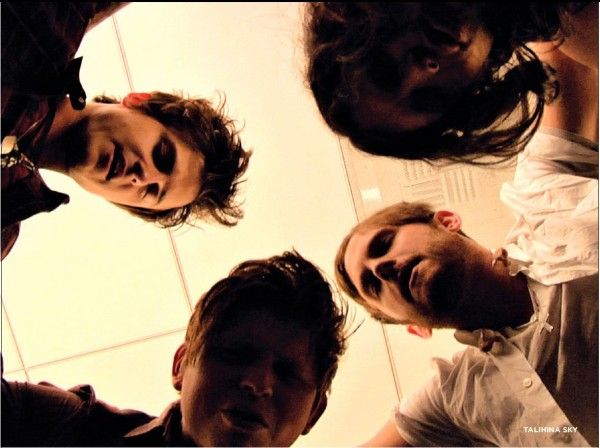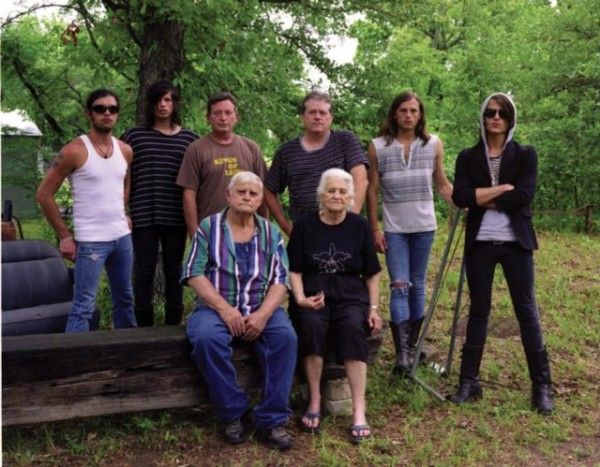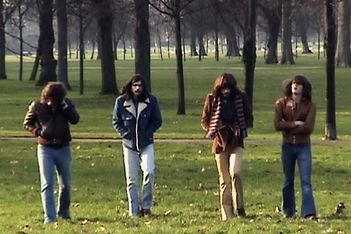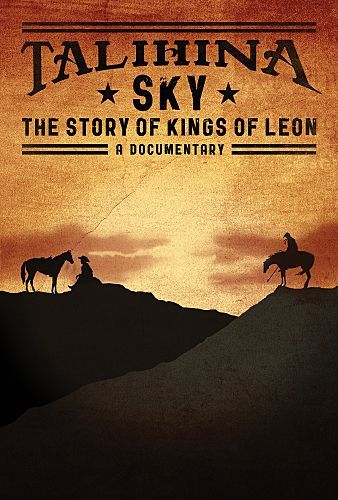When three teenaged brothers and their cousin rebelled against their strict, religious Southern upbringing, Kings of Leon was formed. With a humble backstory that has garnered almost as much attention as their music, Caleb, Nathan, Jared and Matthew Followill have gone on to record six albums, achieve worldwide success and win Grammy Awards. While living in Nashville, Tennessee and working in music publishing, Stephen C. Mitchell signed then-unknown musicians Caleb and Nathan Followill to their initial songwriting deals. His decade-long friendship with Kings of Leon is now reflected in his directorial debut (premiering on Showtime on August 21st), which combines personal home videos, interviews and behind-the-scenes footage in a raw, emotional and intimate way, showcasing the band’s journey from their small-town beginnings to living the rock star dream. For fans of the band, as well as those who may be totally unfamiliar with their music, it is an exploration of family bonds, fame and the work ethic that has gotten these musicians to the top. Hit th ejump for more.
During an exclusive phone interview with Collider, Stephen C. Mitchell talked about the journey he’s taken with the Followill’s for the last 10 years, the process of going through 700 hours of footage to determine what to include, drawing the line between being their confidante while also being a truthful historian of who they are and where they came from, his plans to make a DVD package that is valuable to fans, and that he hopes people see how hard-working the band is and that, even at the level they’re at now, they are still willing to be vulnerable and put themselves out there for people to see. He also admitted to being fired up about filmmaking now, and that he plans on making a couple more documentaries before he makes the leap to narrative features. Check out what he had to say after the jump:
Question: How did this whole thing come about for you?
STEPHEN C. MITCHELL: Well, I met the boys 10 years ago and met their family. I was living down in Nashville, Tennessee at the time and was working in music publishing, so I signed Nathan and Caleb [Followill] to their initial songwriting deals. I met their family and learned of their backstory during the process of time where they were putting their band together. I pretty much knew, at that point in time, that this was a story. I wasn’t even working in the film industry at that point, but had aspirations to do so and was like, “This is going to be a story I’m telling.”
So, you just started documenting things, at that point?
MITCHELL: Yeah, we did, actually. We lost all of our early footage. I had filmed them in the garage, putting the band together with their cousin and brother, and us just goofing around during that era of time. For whatever reason, they had the tapes in a camcorder bag and they were out on tour, and I think it got stolen or something, so that footage is gone. But, from that point forward, they did a lot of filming themselves, just with handheld camcorders when they were out on the road, and then I filmed a bunch and we were able to acquire footage from their label and other talented people. It’s really a pretty amazing collection of a lot of various sources of footage on the band. I don’t know that you ever are fully comprehending that you’re capturing that moment in time and, if you were to get super-huge, it’s valuable footage. The Followill’s just had fun filming each other. Their family always filmed them. We have a lot of amazing footage of the boys that the family denoted from when they were kids. It was pretty neat to see all of that. We had 700 hours of footage, so you can only imagine the task of going through all that stuff and figuring out what you’re going to do.
How long of a process was it to go through all of that footage and determine what you wanted to use, and how difficult was it to fill in the time period for what was missing?
MITCHELL: There was so much to cover. It seemed, to a lot of people, like they had not been a band for that long, but at the same time, they had put out five albums, at that point. We had a lot of turf to cover, but we didn’t want to make the typical rock doc. We didn’t feel like they needed to do that. The boys were very focused on doing something different. If we were going to do it, it had to be different and great. We could have maybe focused a little more on going from this album to that album, but we really just wanted to take people on a journey through their lives and tell a great story that way. It’s not typical to most music docs, in that regard.
Was it important to you to make a film that both the die-hard fans of the band and people who had never heard of them could watch and really get something out there?
MITCHELL: Yeah, I think you’ve got to force yourself to think that way. Fortunately, I’m really lucky. This is the first film that I’ve ever made, and I had a lot of very talented people to work with, like Casey McGrath, my producer, and Paul Greenhouse, who edited for us. We had a really amazing team of people that could help us stay focused and really say to ourselves, “Okay, if the worst case scenario here is that Kings of Leon fans are rewarded and love this, and we’re able to give something back to them, from this band they love,” that’s a victory, and that’s a big victory, considering how large their fanbase is, around the world. But, on the other hand, it was a great opportunity to reach out to people that think they know the boys, or know about them, or maybe only know a few songs, or maybe don’t know anything. They’ll still love the film, whether they like the band’s music or not. They have a great story.
In doing a project like this, where do you draw the line between being a friend with doing a job? Is it difficult to balance being their confidante with also being a truthful historian of who they are and where they came from?
MITCHELL: Yeah, it is a challenge, and it was, for the entire process. You have a job to do. You’ve got to tell a great story, and you’ve got to make it raw and intimate and engage people. But, at the same time, I’m their number one fan. I call myself, “Kings of Leon fan #1,” because I was there in the early days. I’m proud of them and I really value my relationship with them and their family. Maybe I’ll never make another film where I have this challenge in my face. In fact, I’m looking forward to being able to just work on a project. I’m a little emotionally tired, at this point, even though that may sound a little odd to say.
Because the downs shape a band just as much, if not more, as the ups do, did you have to think about showing both the good and the bad of the band?
MITCHELL: That’s real credit to the band, themselves. They’re the executive producers of the film, so they’re approved everything. We had to walk them through that process of, “I know you don’t like watching yourself getting yelled at, or not acting the way you wish you had here, or you don’t look as good, but step back and, if you’re willing to be vulnerable and put that out there and come up with a great arc, people are going to respond to that honesty.” Give that credit to them. I think they realized that, if you’re going to do this, you’ve got to offer that to people, otherwise you are just making a glam piece. Who cares about that?
Since every band that spends any length of time together obviously has fights, do you think more gets made of it with Kings of Leon because they are family?
MITCHELL: Yes, I really do. It’s been something that’s borderline made me mad, a little bit, as their friend. Maybe it’s what really attracts people to the band. They are three brothers and a cousin, and that’s pretty special. That’s like the old school bands, like the Allmans. That’s pretty neat. It’s really what maybe has held them together and helped them make five albums, in such a quick span of time. But, on the other hand, if you lump a bunch of brothers and cousins together, you’re going to have them go at it, here and there. I have a twin brother and an older brother, so I know what that’s like. I love my twin brother, but I’d love to choke him. It’s just that thing with brothers. Sure, it gets made a big deal, probably more than anything.
Do you think there have been points where the fame has gotten to them, or is it something they’ve just had to learn to deal with?
MITCHELL: I think anyone has to adjust and learn how to handle success. Anyone that says that that’s not part of the process is bullshitting. Who’s ready for their life to turn like this? You can be as prepared as you can and have a good family structure behind you to keep you grounded and keep it real, but for those people that are successful in the entertainment business, whether it’s acting, directing or being in a band, it’s about learning how to handle that success well and what will happen for you after that, if you have some longevity.
Being friends with them and seeing them decide to cancel their tour, do you think it’s more admirable of them to cancel the tour and deal with whatever they made me going through than just continue to go on, to the detriment of themselves and the audiences that come to see them?
MITCHELL: I wasn’t down there at that event, first of all, and I haven’t yet talked to them because I’ve been so busy. I don’t even really know what happened, so I don’t want to speak on behalf of the band or act like I’m their spokesperson because I’m not and I don’t make the music for them. But, I do know they work their asses off and they care. Caleb puts a lot of pressure on himself to perform at a high level. They still have that chip on their shoulder. I watch them. They are driven. They work hard and they practice hard. I think they work harder than most bands I know out there. Why they have had success is to their credit. So, I don’t think they would take any move like this lightly. I think they care about their fans. I think that’s fair enough to say.
Why is this point in the band’s career a good time to document their history, and what do you think it is about this band that has led so many people to identify and connect with them?
MITCHELL: When we were making this, they didn’t give me any guarantee that it was ever even going to come out. If I could make the film and get it done, I would just let the cards fall from there. I actually had it done right before the Come Around Sundown album, and they decided not to put it out. We were thinking about releasing it, at that point in time, so I was a little disappointed and bummed. But, I went back into the lab with my editor, and we moved some scenes around and added some things and fixed a few things, and then went back and showed them, and it was really amazing. They were already happy, but then I went back, since they said, “Let’s hold off for awhile.” So, when we renovated it a bit and shined it up, they were just super-excited and really proud. We all looked at each other like, “Wow, we just made a movie.”
Do you have additional footage and deleted footage that you’ll put on the DVD release?
MITCHELL: Yeah, I really want to make the DVD package valuable to fans and people that want to buy this film. That’s a real struggle in the marketplace right now, so you’ve got to have some value when you release that to people. So, we’re going to include the home movie series, which we did online in 2008. That’s a really fun internet series that we released, and the fans went crazy over it. We’re really proud of that. Then, there’s a lot of deleted, funny bonus stuff that I think people are going to really be excited to have.
What do you hope that people seeing this will get out of it, in regard to the band, their music and who they are as people?
MITCHELL: They’re a great band, and they’re America’s band. There are not a lot of successful rock bands out there from America right now, and it’s a challenge to have a career. I’m not talking about putting out one or two albums. I really hope that people who haven’t gotten to know them, their backstory or their music, realize that they have a pretty large body of work that’s pretty stellar, when you look at it as a whole. Not many bands are doing that right now. The musical side of it is, “Hey, look at their vast catalog.” But then, on the personal side of it, I think that people should really embrace the fact that they’re at the level that they’re at and, despite everything that’s going on right now, they’re still willing to be vulnerable and put themselves out there for people to see. It’s not easy to be successful. It’s a lot to handle. It’s a pretty admirable, cool thing of them to do that right now.
Had you always wanted to get into directing?
MITCHELL: As a kid, I would joke and tell people all the time that I was going to start writing books, and I would put on puppet shows, and wanted to make movies one day. That’s just who you are at your core, at that age. I got away from it a bit, but I always did have that desire to do films. Maybe the band reignited that fire, when I learned their story and thought, “I’ve got to do this.” I think it’s a combination of the two, really.
Is that something you’re actively focused on doing again?
MITCHELL: Yeah, I’m so fired up! I love it! I haven’t been this excited, in a long time.
Are you looking to do more documentaries, or do you want to try a feature next?
MITCHELL: I would like to do a couple more documentaries ‘cause I feel like I’ve learned a genre that’s really growing and expanding, and there are a lot of hybrids right now, so I’m excited. I’ve got a couple sports stories that I’m interested in, and some world news events that I would like to cover, and some things I’m looking at. But long-term, I’d like to tackle the narrative mountain, and I hope I get that chance. Maybe I have more to learn still, to do that really well, but I’d love to.
TALIHINA SKY: THE STORY OF KINGS OF LEON premieres on Showtime on Sunday, August 21st





